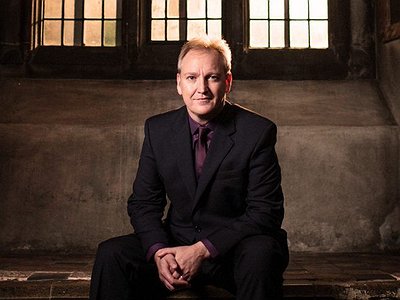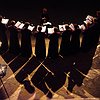Part 1
Name: Nigel Short
Nationality: British
Occupation: conductor of Tenebrae Choir
Current Event: Sounds of the Solstice with Tenebrae Choir at Chiltern Arts Festival in February.
Recommendations: Seven Last Words of the Cross by Sir James MacMillan. This piece knocks me for six every time we perform it. In 15 years of performing this work I’ve not yet walked off stage without tears streaming down my face and simply being unable to breathe for the aching sense of loss and pity / The roof of the Sistine Chapel. This isn’t just a work of art; it’s a man’s life, heart and soul poured out into one physical creation. I’ve seen it three times in my life and each time I am left speechless for as long as I’m allowed to stay there. One day I would like to hear Tenebrae sing Lobo’s motet Versa est in luctum and Allergi’s Miserere there. One day...
If you enjoyed this interview with Nigel Short, visit the Tenebrae website to buy their music and learn about upcoming events.
When did you start conducting, and what or who were your early passions and influences? What was it about music and/or sound that drew you to it?
I was hooked on the sound of a choir from the first moment I walked into my local Parish church, aged 7 years, and heard the boys singing in the distance. Something about the architecture of the ancient church (Solihull has a 13th-century Parish church) and the sound of the choir bouncing off the walls was really exciting and I couldn’t wait to get back there a few days later to start joining in. I didn’t start conducting until I was 34 years old, after I’d hung my vocal cords out to dry for the very last time with the King’s Singers at the end of the year 2000. The biggest and earliest influences on how I wanted Tenebrae to sound were Simon Preston, Barry Rose and David Hill. These three gents were the Directors of Music at Westminster Abbey, St Paul’s Cathedral and Westminster Cathedral respectively. I sang regularly in all three choirs and found each one had something wonderful about it that came directly from the individual standing out in front. Tenebrae is a combination of all three, I think. Simon Preston for the precision and perfect ensemble, balance and intonation; David Hill for the open, expansive and dramatic approach to singing as a choir; and Barry Rose for an exceptional attention to the details of every word you would ever sing.
For most artists, originality is preceded by a phase of learning and, often, emulating others. What was this like for you: How would you describe your own development as a conductor and the transition towards your own approach?
I didn’t have the chance of a transition really; I was thrown in at the deep end and had to discover how to get what I wanted from singers as I went along. I knew what I wanted, just not how to get it. In the early days I think I was definitely a little on the intense side, but as I’ve matured I like to think I can now access that intensity just within the music we perform, rather than making myself and the singers nervous!
How do you feel your sense of identity influences your creativity?
They go hand in hand. Tenebrae’s motto is ‘Passion and Precision’ (back to the combination of my early influences) and, whatever we sing, we work hard to make the music as precise as we can while also performing it with as much commitment and passion as possible. I have a habit of referring to the rehearsals as “nuts and bolts”, but once we get to concert time you have to forget about the nuts and bolts and discover that other place in your mind where you’re on the edge and pushing yourself to reach beyond your comfort zone. That’s why we can never replicate what we do in concerts during rehearsals; there always has to be an X factor that you can only access once you’re in front of an audience.
What were some of your main artistic challenges when starting out as a conductor and in which way have they changed over the years?
As mentioned previously, my biggest challenge was my lack of experience in directing singers. Having sung in some other well-known vocal groups, I had a good handle on the kind of approach that works for some singers, but everyone is different. As I’ve grown I’m much more comfortable trusting singers to give of their best and I don’t worry about controlling everything within an inch of its life. Music has to live and breath as we the performers do, so I work hard now to have a happier balance between being demanding and encouraging. Singers can’t breathe well if they’re too tense, so I like to breathe with them at the starts of phrases to make sure I’m in sync with them and can feel if things are getting too intense. There’s a magic point where the focus between myself and the singers can really intensify and draw audiences in, and that’s when we give our best performances.
As creative goals and technical abilities change, so does the need for different tools of expression. Can you describe this path for you, starting from your first instrument to becoming a conductor?
I have realised that it’s not a good thing to become too prescriptive in the way you perform any particular piece of music. Once you’ve put the nuts and bolts in place, for me it’s important to then allow that music to live and breathe in the moment and have some degree of spontaneity. No matter how many times we perform Handel’s Messiah or Joby Talbot’s Path of Miracles, I don’t ever want two performances to be exactly the same. Creative goals and technical abilities are important to get the ball rolling as a conductor, but by no means are they the be all and end all.
Tell us about your "instrument", the ensemble in this case.
I like a particular sound in which you can hear every note. Over the centuries we have become used to hearing choirs with very dominant top lines, and I realised as an alto that once you’re singing below that top line you’re inaudible for a fair degree of the time. I learned from working with The King’s Singers how creating a vocal balance whereby everything is built on the bass, the foundation, you can achieve better intonation. An environment in which singers are encouraged to listen for balance, intonation and blend means that there is automatically a focus on approaching the text in the same way, and that’s the most important aspect of our sound; the clarity and attention to every word we sing. So, I like a fairly hefty rich bass sound in the choir - that’s why whenever I can I have an extra low 5th bass - and then the higher you go in the choir the lighter the vocal colour becomes. I am always asking the sopranos for a pure sound that shimmers; not a sound without vibrato, but certainly not a free-for-all where each singer does what they like, or else you’ve got different ideas and approaches going on at the same time. Sometimes that approach ends up with singers doing the opposite things whilst probably trying to achieve the same end result.
How would you describe your approach to interpretation? Where do you start and how do you develop your view on a piece, what are some of your principles and what constitutes a successful interpretation for you?
I don’t have any hard and fast rules for interpretation. When it comes to early music I think there’s a very sound approach that has been put in place by the great early music conductors in the latter half of the twentieth century (e.g. Peter Philips of The Tallis Scholars and Sir John Elliot Gardiner), and we tend to follow these well-established ideas of sound and disciplines. With regard to music composed after then I like to try and create the feeling that we’re singing and performing music for the first time, and that an audience is hearing the music for the first time too. Whatever we do it must be for the good of the music. If we take care of this principle then audiences will be happy and keep coming back to hear us perform. It’s always about the music and not the musicians. We are custodians of these works of art. We make them come alive by performing them but we don’t own them and without them we’re nothing. I sometimes feel in the modern era certain parts of the classical music world have become all about a handful of famous artists, and that the music they perform is a secondary consideration.






